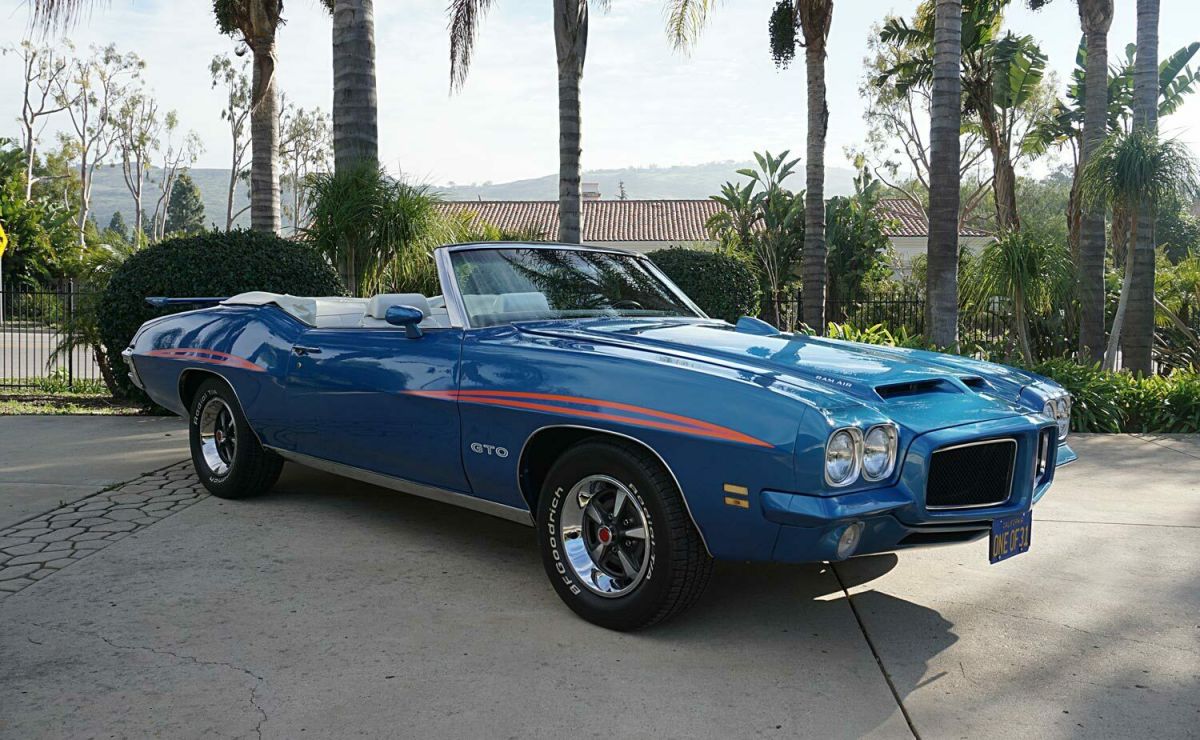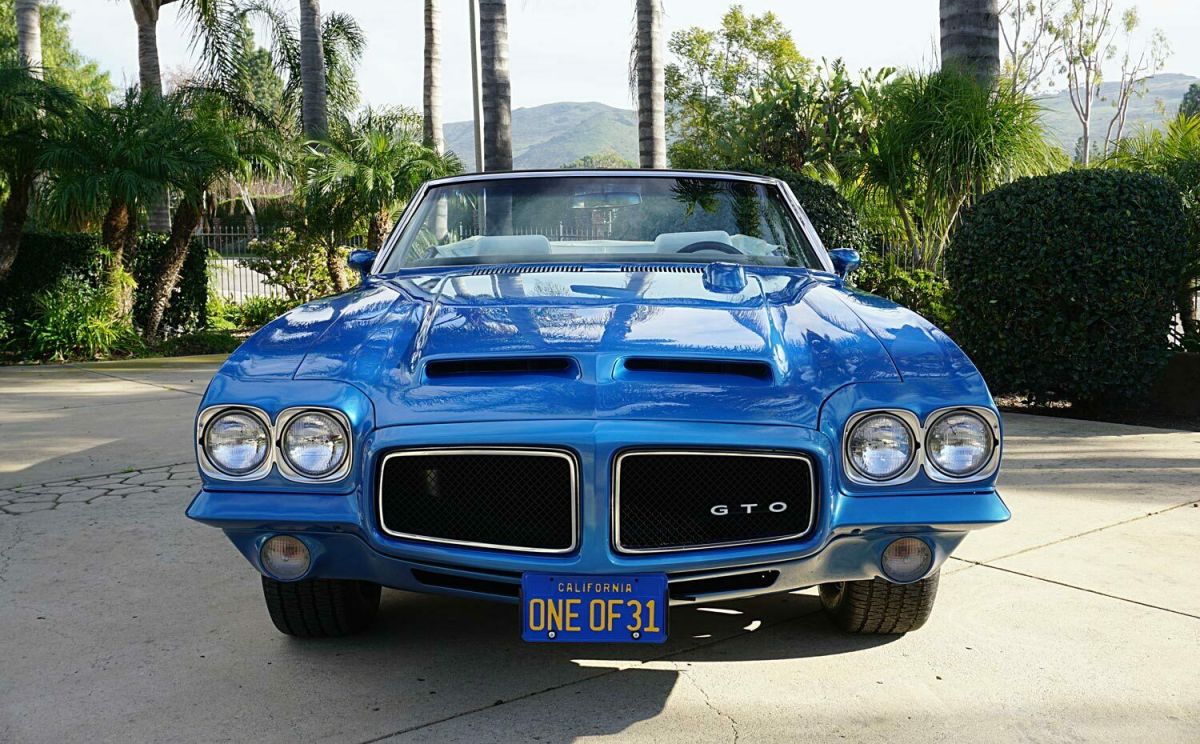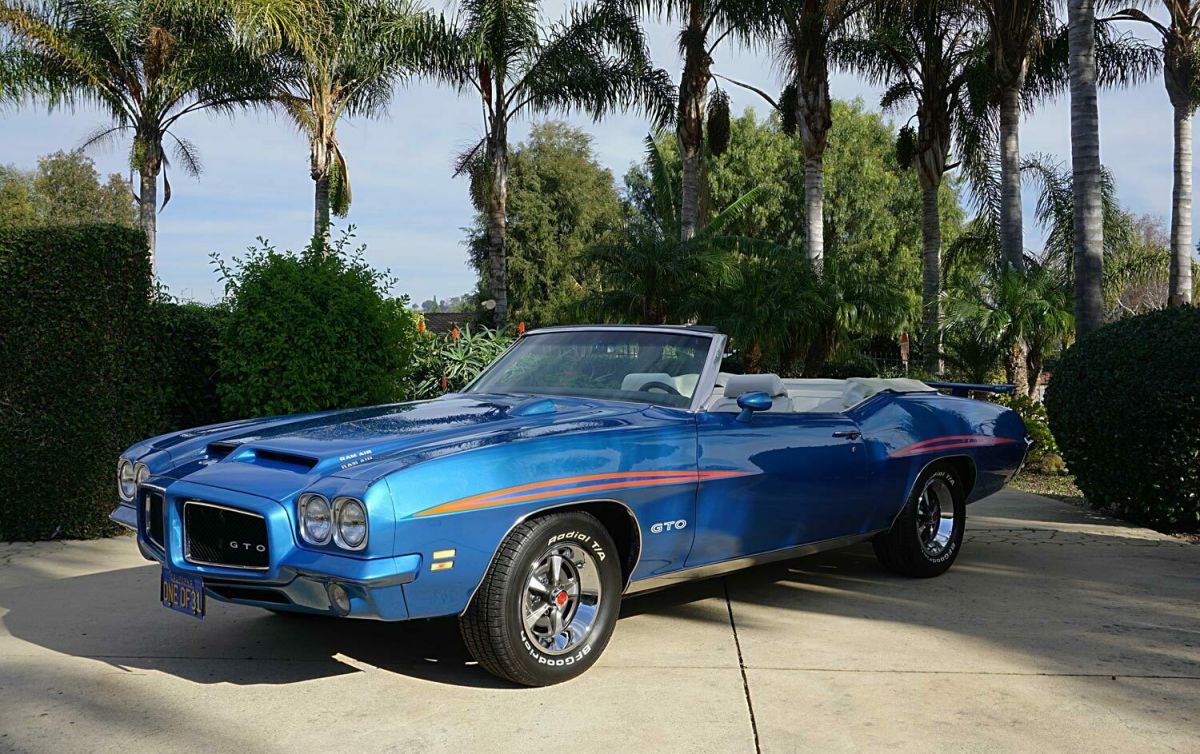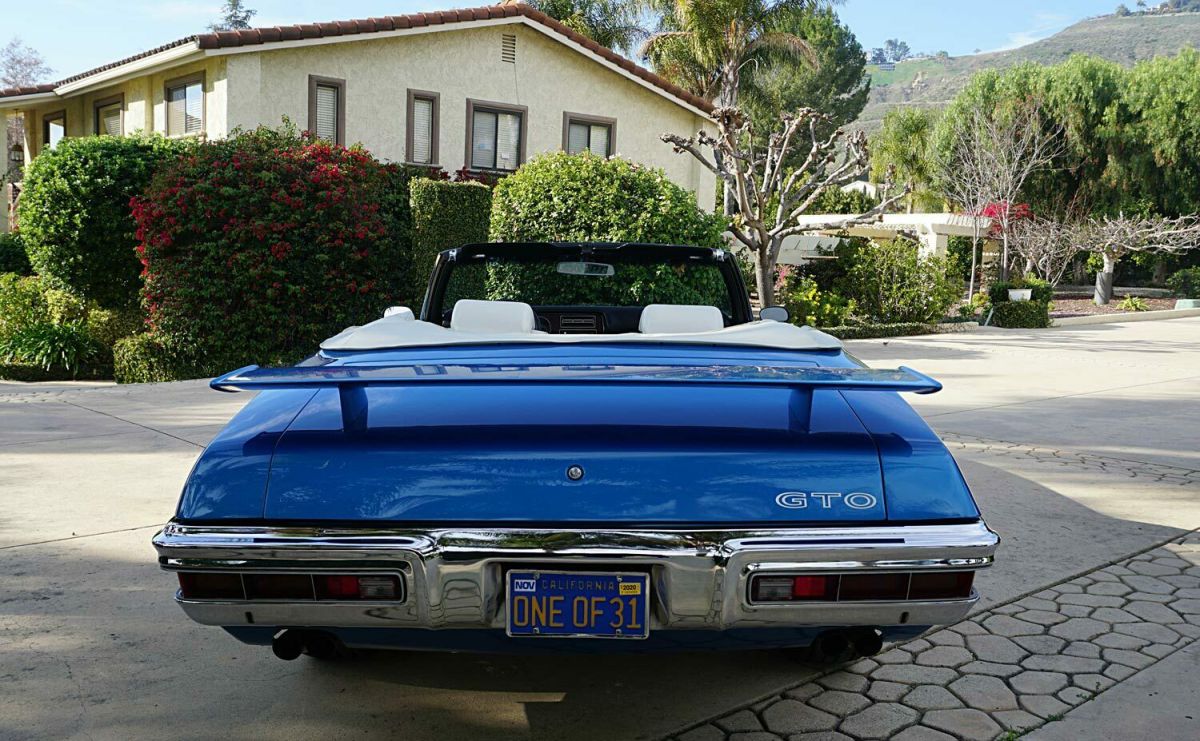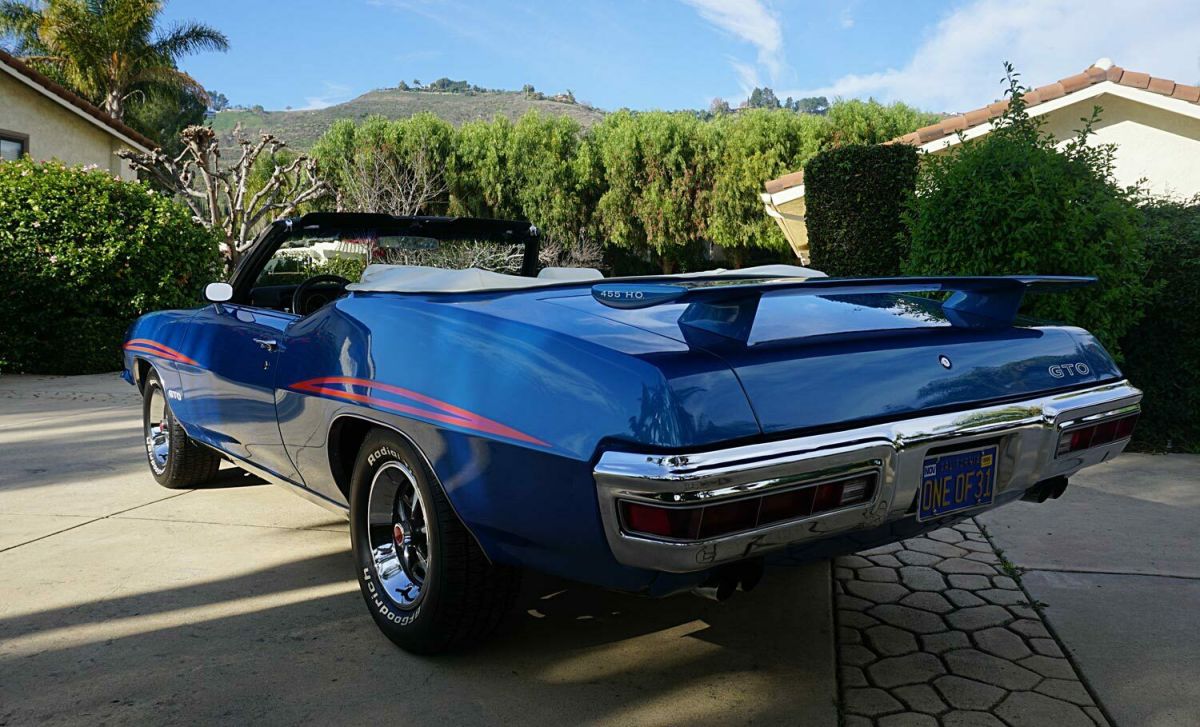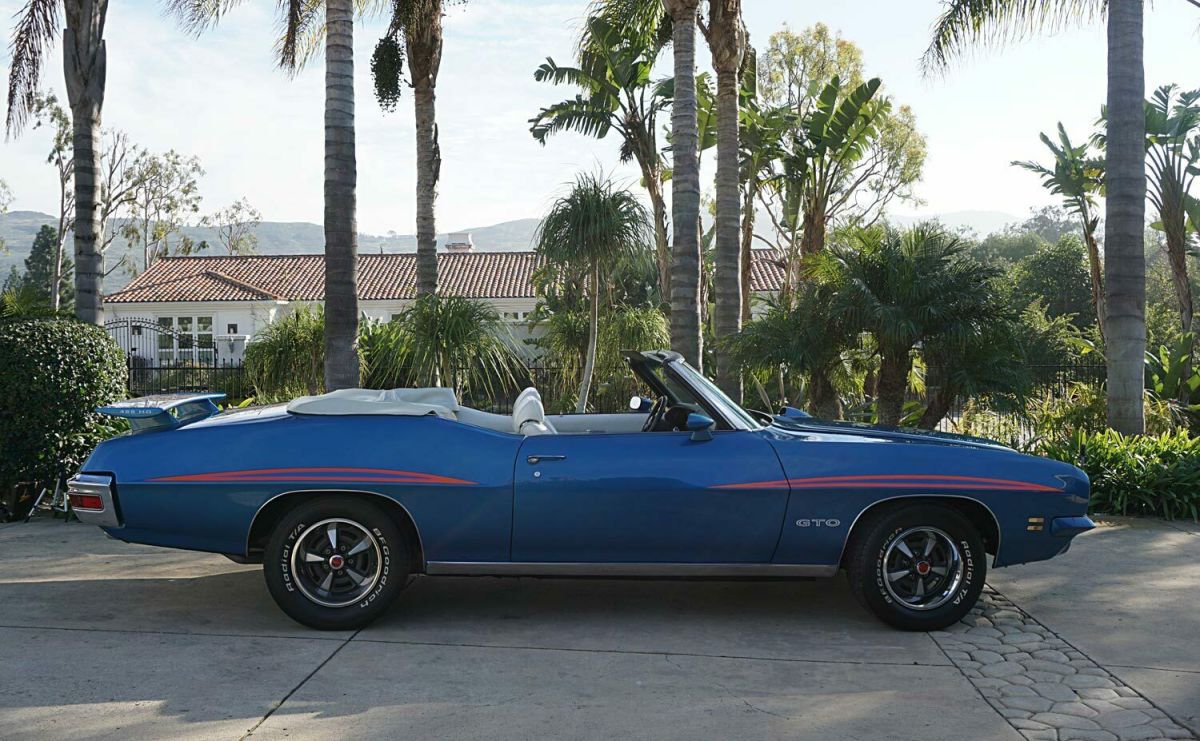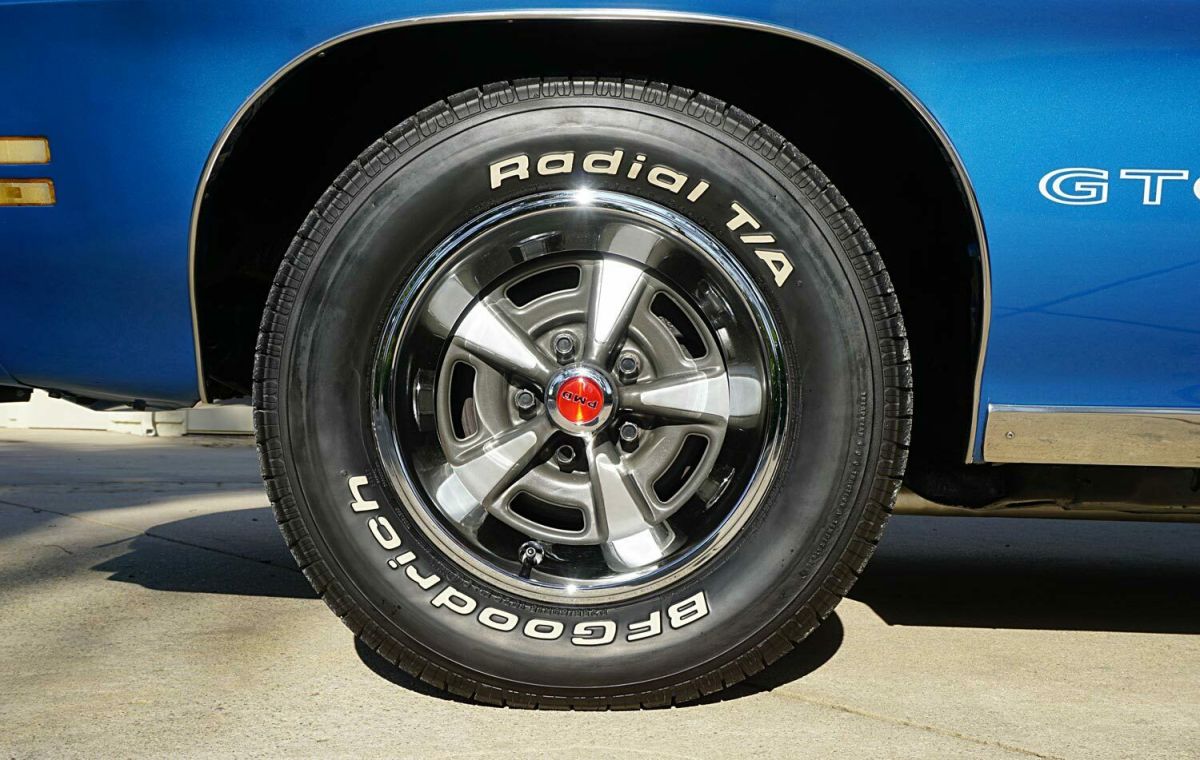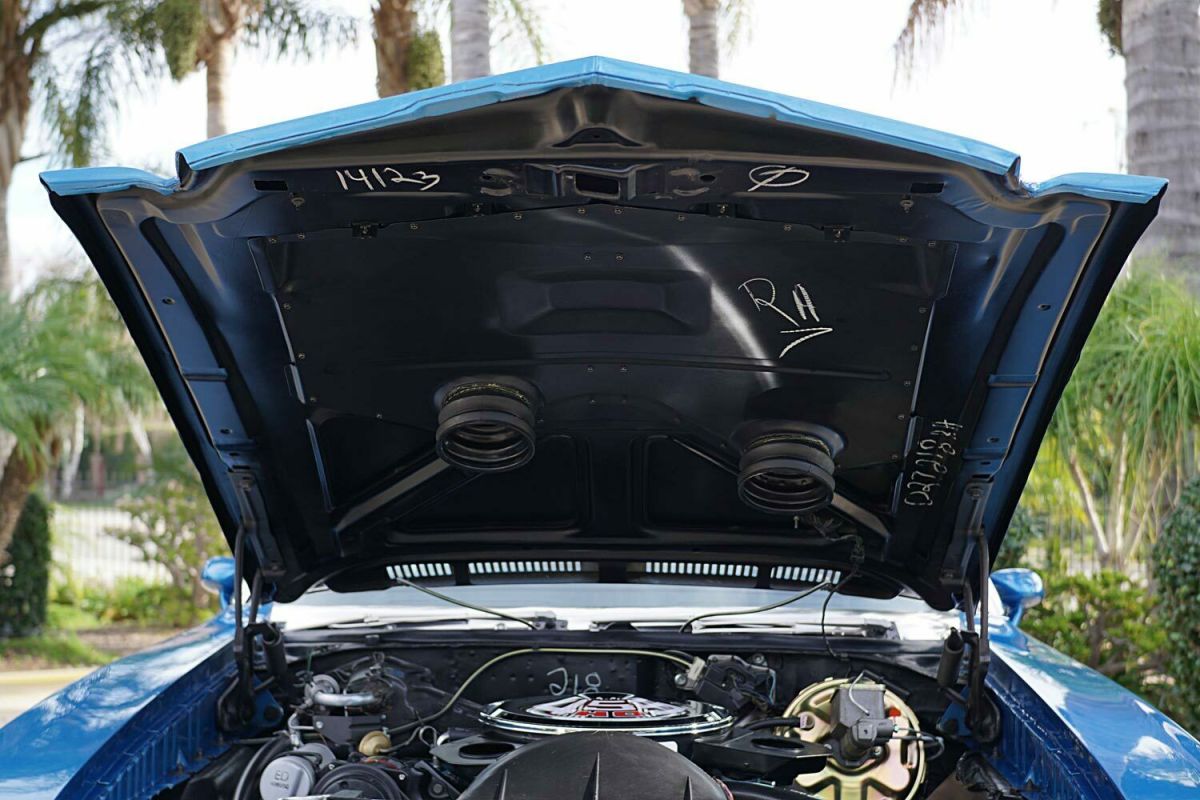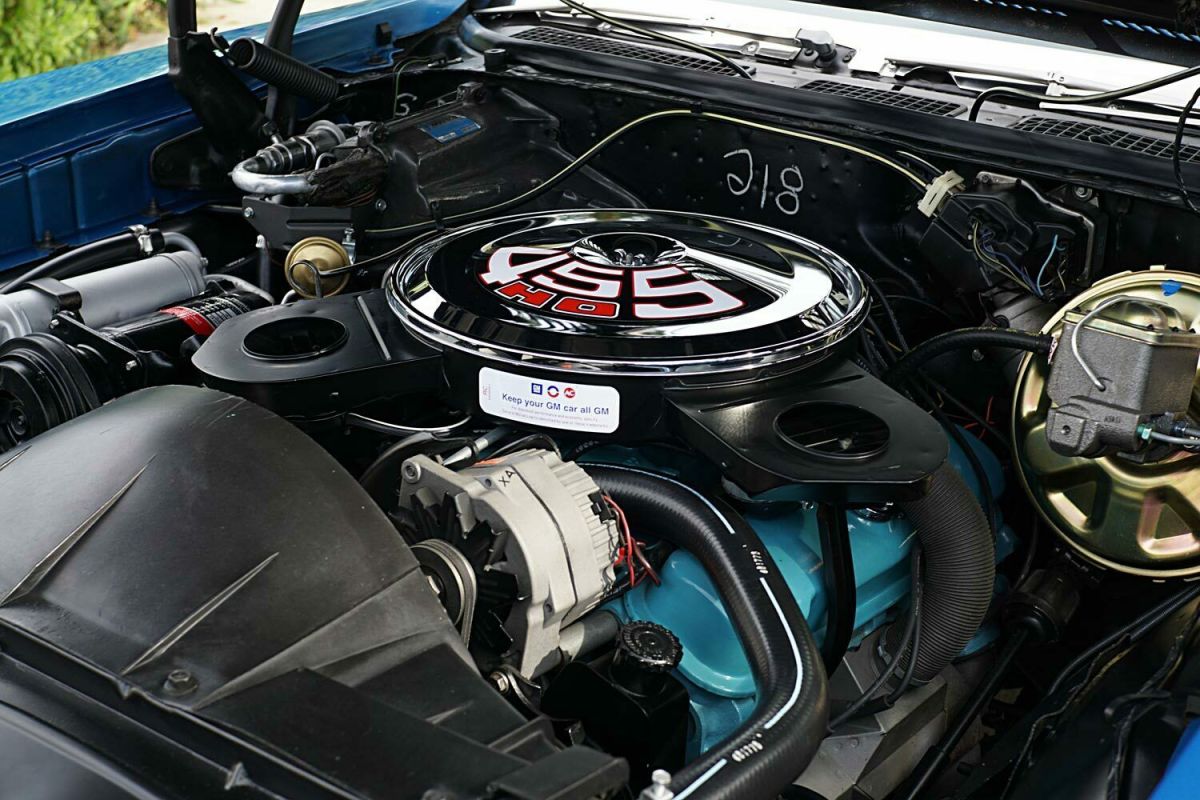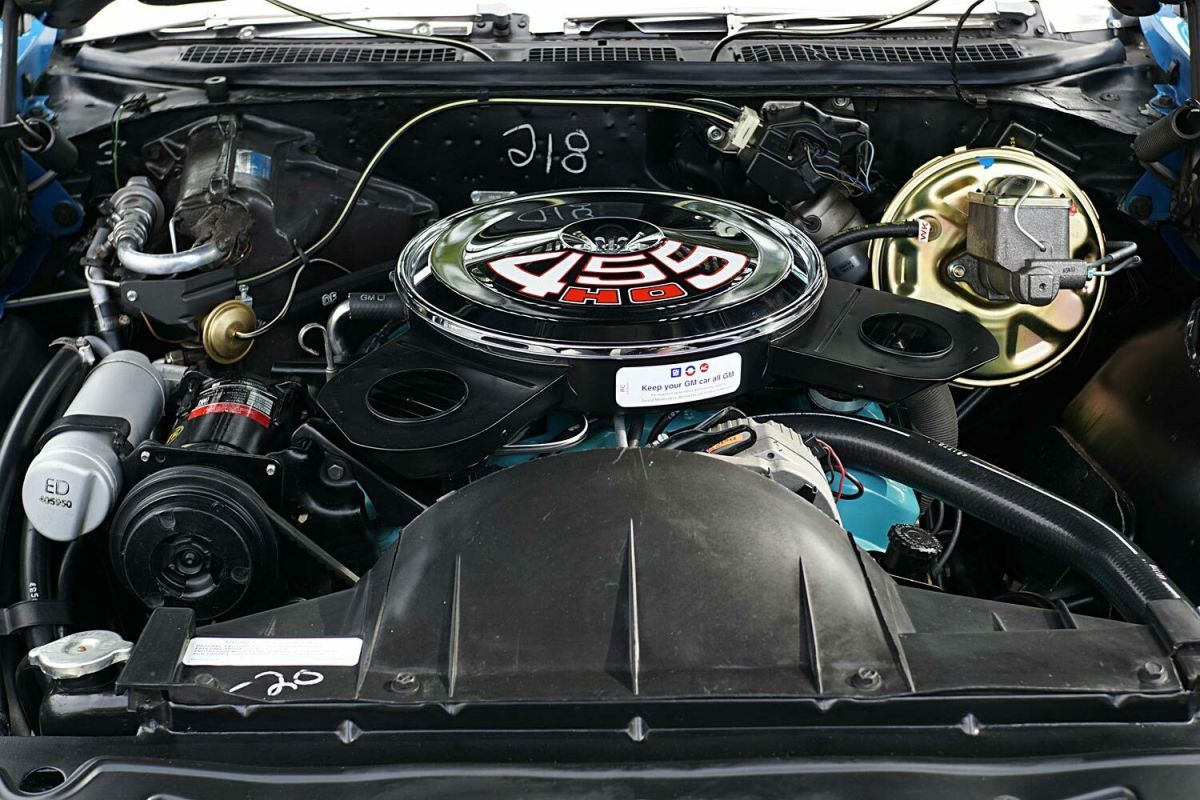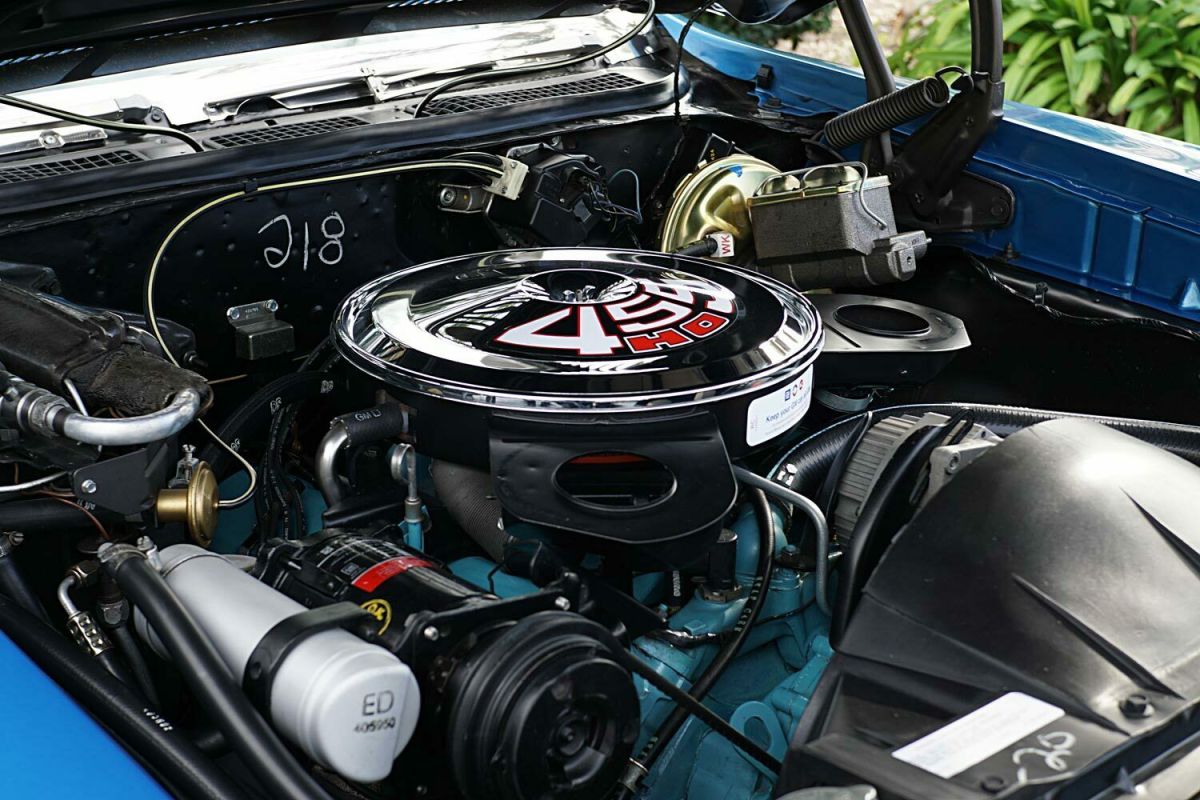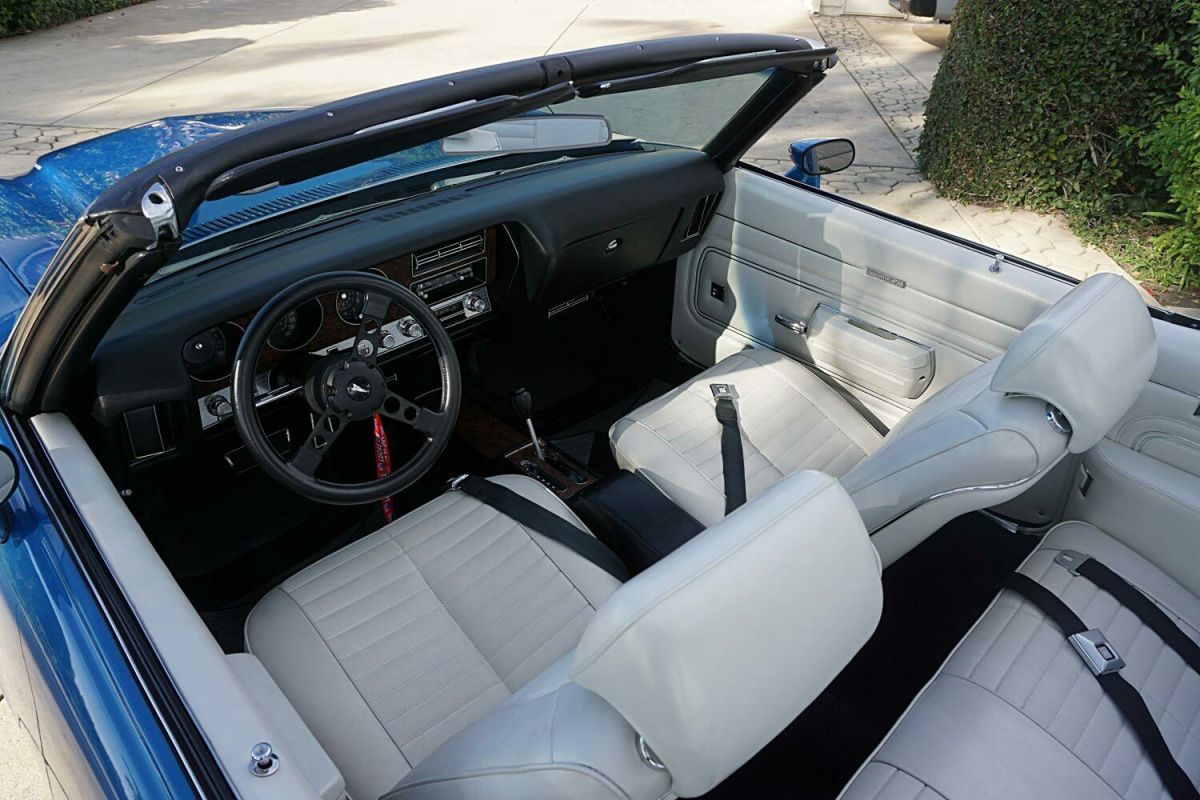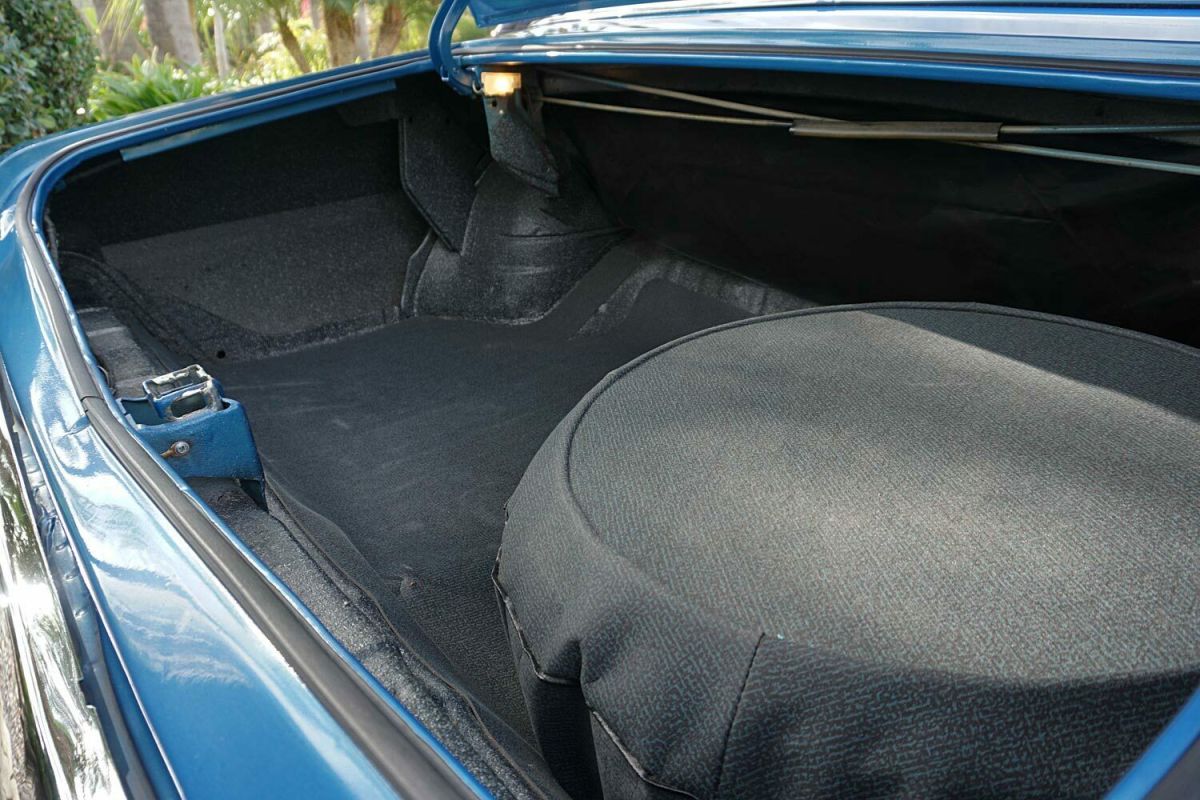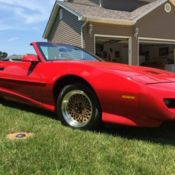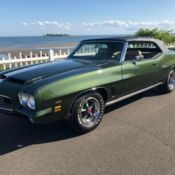1971 PONTIAC GTO CONVERTIBLE - 455 ENGINE H.O. - 1 OF ONLY 31 PRODUCED
Technical specifications of Pontiac GTO 1971
| Price: | US $125,000.00 |
|---|---|
| Condition: | Used |
| Item location: | Oxnard, California, United States |
| Make: | Pontiac |
| Model: | GTO |
| SubModel: | GTO |
| Type: | Convertible |
| Year: | 1971 |
| Mileage: | 22000 |
| VIN: | 242671P113750 |
| Color: | Blue |
| Engine size: | 455 H.O. |
| Number of cylinders: | 8 |
| Power options: | Air Conditioning, Power Windows |
| Fuel: | Gasoline |
| Transmission: | Automatic |
| Drive type: | RWD |
| Interior color: | White |
| Drive side: | Left-hand drive |
| Options: | Convertible |
| Vehicle Title: | Clean |
| You are interested? | Contact the seller! |
Description
You are bidding onone (1)1971 PONTIAC GTO CONVERTIBLE - 455 ENGINE H.O. - 1 OF ONLY 31 PRODUCEDHere is a link to the youtube video of the walk around including the underside of the GTO and the engine:
https://www.youtube.com/watch?v=WN8h0kKxIyA&feature=youtu.be(please copy and paste into your browser)
Car has been extensively restored and has PHS documents. Please read the magazine print text below to get a better understanding of the history of this car and the extent of the restoration process. Feel free to message with any questions. I encourage you to send your GM expert to perform a complete inspection prior to purchase.
Specification sheet of all numbers is posted in the picture gallery.
This is a no expense spared.... legitimate restoration of a very rare Pontiac.
The GTO was featured on the cover of the April 2018 print copy of Hemmings Muscle Machines.
https://www.hemmings.com/blog/article/dont-judge-me-1971-pontiac-gto-455-h-o/
Here is the print text from that article:
You’re forgiven for your confusion. Some of the hardest of hard-core muscle-car gear heads have no idea this car existed. But Yes, Virginia, there is a Santa Claus… and it’s true, Pontiac built 455 H.O.-powered GTO convertibles that were not Judges. We got up close and personal with one of the 31 examples to roll out of the factory for 1971.
Pontiac acknowledged the sea change taking place in the industry at that time—increasing emissions controls, safety regulations, and insurance rates were notably altering the vehicles that automakers could build, and what consumers would buy—by modifying its traditional ordering protocols. General Motors had lifted its engine displacement-and-body-size edict for 1970, making 400-plus cubic-inch V-8s available in intermediate platform cars, and each division took immediate advantage. The following year, many of the go-fast components formerly restricted to flagships like the GTO, could be ordered in lesser models. That’s how, in 1971, a Pontiac customer could specify his or her GTO convertible be built with the Judge’s standard 455 High Output engine, and could opt to have installed—either by the factory or via the dealer’s parts counter—the Judge-style visuals our feature car sports.
It’s that special LS5-code H.O. V-8 paired with the convertible body that makes Steve Fusci’s 1971 GTO so unusual. Though it was standard in the Judge for that year, a mere 17 Judge convertibles were built for 1971, and as noted above, it wasn’t much more common in lesser droptops. The 1971 GTO 455 H.O. convertible was such an unknown quantity, it wasn’t on the radar of this dedicated muscle-car collector, when he discovered this one less than five miles from his Santa Rosa Valley,California home.
This 455 H.O.’s original Quadrajet was force-fed by a factory-installed Ram Air system. The V-8 did not require rebuilding during the car’s body-on-frame restoration, and as of press time, has been driven just 22,000 miles.
“It was bought new at Sheehan Pontiac in Lighthouse Point, Florida, and came to California in the mid-Eighties,†Steve tells us. “I learned about it through a friend who had two 1971 Judge convertibles, which I consider to be the Holy Grail of Pontiacs; he’d been helping this car’s second owner acquire parts to restore it. It had been sitting in that guy’s garage for about 20 years, and he hadn’t done much with it since he got married and had twin daughters.
“When I found it in 2005, the GTO had stuff piled on top of it. It looked like an erector set—the interior was out, the fenders were off, but almost everything was there,†he recalls. “It needed a new top, the engine needed detailing, everything was a mess. The body had some dings, chips, and dents, but the core was very solid—it wasn’t a rust-bucket, and there were 18,100 miles on the odometer. The top and interior were shot, and the transmission was slipping; I think that’s why he parked it, with the intention to restore it. But unless you understand all that goes into a restoration, it can be overwhelming, and you need the wherewithal to stick with it. He just never got around to it, for whatever reason, which was my luck. We pushed the car on a trailer, loaded all the parts in a pickup truck bed, and brought it home.â€
It took some research for Steve to fully understand just what he’d purchased, and the numbers were revealing: It was a very specially optioned example of the 661-total GTO convertibles (excluding the Judge) built for 1971. Rather than choosing the standard L78-code, 300-hp, 400-cu.in. V-8 or optional L75-code, 325-hp 455, the car’s first owner spent $136.92 (roughly $829, today) to get the new High Output version of Pontiac’s 455. Multiple performance-oriented components separated the L75 and LS5 V-8s, and the premium goodies list for the latter included a nodular-iron crankshaft turning under four-bolt main caps, an “068†camshaft, and heavily revised round-port heads (the lesser 455 used more typical D-port heads) feeding Ram Air-style exhaust manifolds. A dualplane aluminum intake manifold mounted a Rochester 4MV Quadrajet, and a Ram Air intake setup was available, optionally fitted to our feature car.
To allow this engine to run on unleaded fuel, Pontiac engineers enlarged the combustion chambers, lowering the compression ratio from the 10.25:1 that was common to performance Pontiacs, down to 8.4:1. The long 4.250-inch stroke made the hydraulic-lifter H.O. rich in low-end twist. Indeed, while the power figures—a gross-rated 335 hp and 480 lb-ft of torque, or 310 and 410 in the new net ratings— were lower than those for GTO engines of a few years prior, Pontiacs powered by the beefy 1971 455 H.O. V-8 were said to be among GM’s top performers, right off the showroom floor.The “Wide Track†division always ensured the GTO’s road manners were buttoned-down, but this body-on-heavy-duty-frame convertible benefited from carefully tuned dampers and standard front and rear anti-roll bars. Our feature car was optioned with variable-rate power steering, heavy-duty coil springs and tubular shocks, and power-assisted front-disc/ rear-drum brakes. Pontiac Historic Services documentation indicates this GTO left the factory with that year’s stylish new Honeycomb composite steel/Polycast wheels, in this case measuring 14 x 7 inches and wrapped in extra-cost G70-14 fiberglass whitewalls, rather than the 15 x 7-inch Rally IIs Steve purchased it with, although those were also available in-period. And that pricey option of air conditioning meant the TH-400-equipped car’s Safe-T-Track rear end used a 3.07:1 final drive ratio, rather than the 3.31 or 3.55 gearing available with a manual transmission.
After commencing what would become a 10-year-long restoration, Steve determined his convertible retained the serial-numbered mechanical components it was built with, back in December of 1970. He opted not to separate the body and frame, but noted there were no components that weren’t touched in the process.
The console-shifted Turbo Hydra-Matic auto and 3.07-geared Safe-T-Track rear were rebuilt when the car was restored.
“We couldn’t get the engine started for the longest time,†he reveals. “But I dodged a bullet; there was no metal in the pan. We replaced the hoses and fuel lines, and after it finally fired up, we changed the oil and coolant a few times, and it ran better and better. The car just came alive.†The engine didn’t need a rebuild, only repainting and detailing. The Turbo Hydra-Matic wasn’t so lucky, though, requiring a teardown, like the heavy-duty 12-bolt rear end. Careful work by experienced specialists left them functioning flawlessly.
The stash of NOS parts that came with the car—plus those NOS and top-quality aftermarket pieces Steve himself sourced— would come in handy as he built it back up. The Ivory Morrokide vinyl interior was replaced, along with the power-window motors, carpets, and top, and the trunk received correct GM-style spatter paint and a reproduction mat. The rear bumper was rechromed, while the body’s bright metal trim was straightened and polished. The few items that were missing when Steve bought the H.O.—among them, the air-cleaner lower support brackets, the exhaust heat tube, and water control valve—were located and installed.
The PHS paperwork Steve commissioned on this car also reveals it had left the Pontiac, Michigan, factory painted in the very-Seventies shade of Quezal Gold. This revelation surprised its new caretaker, as Steve found no evidence of gold paint under the extant Lucerne Blue finish, inside or out. He did find a few convertible-common areas of easily corrected minor corrosion, though, primarily above the inner rear wheel arches. He attributes the body’s overall solidity to this GTO’s decades of covered storage. “We didn’t do a full repaint, just a lot of touching up in areas. We had to do many spray-outs to make it match that old paint. After it was color-sanded and buffed, it came out pretty nice,†he says with a smile. And the Judge trunk lid “airfoil†and colorful fender accent stripes? Steve says neither was on the Monroney. “I don’t know if the wing was added by the dealer or by the first owner, but I like it. And I installed the stripes. It was never my intent to make this car a Judge clone, but a friend suggested we try out those stripes, since they were optional [separately from the Judge] in 1971. I initially resisted, but he said he’d remove them if I didn’t like them. As soon as they were on, I fell in love—they look amazing, and make the car come alive. It went from a really rare, cool car, to super cool.â€
Since Steve also owns numerous contemporary GM muscle cars— including some 1970 examples familiar to longtime HMM readers, like his Buick GSX (“Street Bomb,†HMM #96), Chevelle SS 396, and ’70 GTO Judge (“DNA-bodies,†HMM #97)—we wanted to know how this particular Pontiac compares to its A-body brethren. “For a big parade float, this thing’s shockingly fast,†he says, laughing. “The engine runs strong, with a nice, loping idle. It just has so much torque, it’s a true H.O. It’s closest to my automatic, 455-powered 1970 Buick GSX. That’s a non-Stage car, and this feels very close to that in torque and quickness—this GTO is almost a performance clone to a GSX.â€
When we ask for Steve’s thoughts on owning such an unusual car, he pauses before replying, “Look at the PHS docs on this car—why would someone check all those boxes? Why spend close to $6,000 on a GTO convertible, when you could buy a Cadillac? It’s weird. I’d love to talk to that guy and say, ‘What were you thinking?’
“People are often confused by it, asking if it’s a Judge clone, because they didn’t know Pontiac made it,†he continues. “For me, it represents a footnote to the 1971 Judge. This is a true unicorn, in every sense. I’d like to see the next caretaker of this car understand it should be treated well, preserved, and not left parked in the rain where a convertible can rust. Drive it, show it, and make sure people understand that this is a legitimate 1971 455 H.O. convertible.â€
OWNER’S VIEW
In doing the research, I found out they made 31 455 H.O. GTO convertibles, as well as 43 non-H.O. 455 convertibles. One H.O. convertible went through Barrett-Jackson a few years ago, and that’s the only other one I’ve ever seen. It’s hard to say how many have survived—of the 31, could there be 10 left?
Every time I take it somewhere, I get amazing reactions. A young couple in their 20s was getting married and asked me to drive them in this convertible; I thought it was cool that they liked it enough to want it in their wedding. It speaks to multiple generations, which made me feel good.
1971 PONTIAC GTO 455 H.O.
335 HORSEPOWER @ 4,800 RPM
480 LB-FT TORQUE @ 3,600 RPM
1/4 MILE: 14.9 SECONDS @ 95 MPH*
S P E C I F I C A T I O N S
PRICE
Base price: $3,676
Options on car profiled: 455 H.O. V-8 ($136.92); Turbo Hydra-Matic transmission ($242.88); Safe-T-Track differential ($46.34); Vari-ratio power steering ($115.85); power disc brakes ($69.51); Honeycomb wheels ($126.38); fiberglass whitewall G70-14 tires ($32.65); special springs/ shocks ($4.21); heavy-duty battery ($10.53); air inlet hood ($84.26); air conditioning ($407.59); power side windows ($115.85); AM/FM stereo radio ($239.08); front-seat console ($61.09); Soft-ray tinted glass ($43.18)
ENGINE
Type: Pontiac OHV V-8; cast-iron block and cylinder heads
Displacement: 455 cubic inches
Bore x stroke: 4.15 x 4.21 inches
Compression ratio: 8.4:1
Horsepower @ rpm: 335 @ 4,800 (net 310 @ 4,400)
Torque @ rpm: 480 lb-ft @ 3,600 (net 410 lb-ft @ 3,200)
Valve train: Hydraulic valve lifters
Main bearings: Five
Fuel system: Rochester Quadrajet four-barrel carburetor
Lubrication system: Internal pressure
Electrical system: 12-volt
Exhaust system: Ram Air manifolds, 2.-inch dual exhaust (currently with Dynomax mufflers)
TRANSMISSION
Type: GM Turbo Hydra-Matic 400 three-speed automatic
Ratios:
1st: 2.48:1
2nd: 1.48:1
3rd: 1.00:1
Reverse: 2.08:1
DIFFERENTIAL
Type: GM 12-bolt (Chevrolet type); limited-slip, with semi-floating axles
Ratio: 3.07:1 ( XE Stamp)
STEERING
Type: Saginaw recirculating ball with power assist
Ratio: Variable; 16:1-13:1
Turns, lock-to-lock: 3.5
Turning circle: 37.5 feet
BRAKES
Type: Hydraulic disc/drum, with power assist
Front: 10.94-inch vented disc
Rear: 9.5 x 2-inch drum
CHASSIS & BODY
Construction: Body on full-perimeter frame; welded and bolt-on steel body panels
Body style: Two-door convertible
Layout: Front engine, rear-wheel drive
SUSPENSION
Front: Independent; upper and lower control arms, coil springs, hydraulic tubular shock absorbers, 11/8-inch anti-roll bar
Rear: Live axle; coil springs, hydraulic tubular shock absorbers, 7/8-inch anti-roll bar
WHEELS & TIRES
Wheels: Pontiac Honeycomb poly-cast steel (currently Rally II styled stamped steel)
Front: 14 x 7 inches (currently 15 x 7 inches)
Rear: 14 x 7 inches (currently 15 x 7 inches)
Tires: Goodyear Polyglass white stripe (currently Goodyear Eagle GT II white-letter)
Front: G70-14 (currently 255/60-15)
Rear: G70-14 (currently 255/60-15)
WEIGHTS & MEASURES
Wheelbase: 112 inches
Overall length: 203.3 inches
Overall width: 76.7 inches
Overall height: 52 inches
Front track: 61 inches
Rear track: 60 inches
Curb weight: 3,870 pounds
CAPACITIES
Crankcase: 5 quarts
Cooling system: 17.9 quarts
Fuel tank: 19 gallons
Transmission: 3.8 quarts (pan)
CALCULATED DATA
Bhp per cu.in.: 0.74
Weight per bhp: 11.55 pounds
Weight per cu.in.: 8.51 pounds
PRODUCTION
The Pontiac Motor Division produced 31 GTO 455 H.O. convertibles for 1971, out of a total of 661 GTO convertibles; 1971 GTO Judge convertible production totaled 17.
PERFORMANCE*
0-60 mph: 7.0 seconds
1/4-mile ET: 14.9 seconds @ 95 mph
*October 1970 Motor Trend road test of a 1971 Pontiac GTO Judge equipped with a 335-hp, 455 H.O., four-speed manual transmission, 3.55:1 axle ratio, and G60-15 tires.
Terms of Sale:
This vehicle is being sold AS-IS, WHERE-IS with NO warranty expressed, written, or implied. Any descriptions or representations are for identification purposes only and are not to be construed as a warranty of any type. It is the responsibility of the buyer to have thoroughly inspected the vehicle to have satisfied himself herself as to the condition and value and to bid based on that judgement. We try to represent it as accurately as possible to disclose any known defects associated with this vehicle. Seller assumes no responsibility for any repairs. We do not warranty anything that may or could happen after the sale. Buyer agrees the venue for any legal dispute to be Ventura County, California.
Payment Methods:
Bank Wire Transfer
